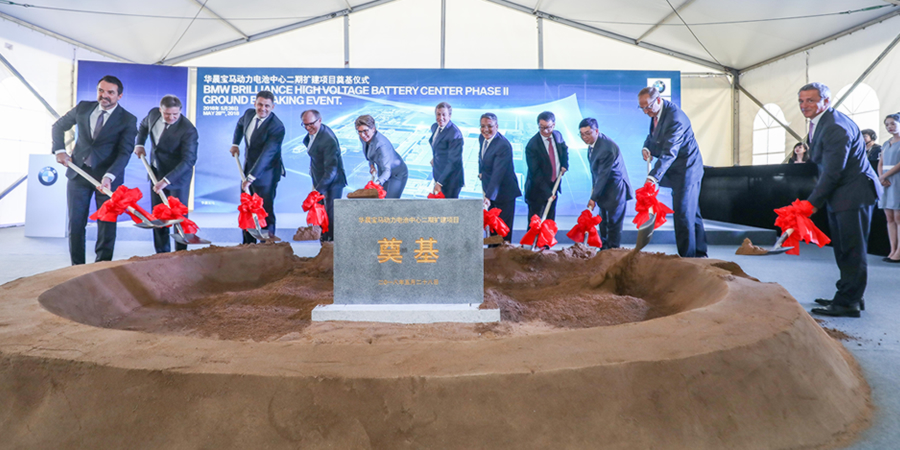The BMW Group continues to drive the expansion of electro-mobility as part of its Strategy NUMBER ONE > NEXT. To achieve this, the company is adapting its production structures to growing demand for fully and partially electrified vehicles. Just seven months after opening its battery factory in China, the BMW Brilliance Automotive (BBA) joint venture today laid the foundation for a comprehensive expansion of the plant. At the “High-Voltage Battery Centre Phase II”, BBA will produce the new, more powerful batteries of the fifth-generation BMW eDrive technology for the fully-electric BMW iX3. Starting in 2020, the BMW iX3 will be built at the neighboring BBA plant Dadong.
Oliver Zipse, member of the Board of Management of BMW AG, responsible for Production: “Today, we break ground for the next stage of our electric model offensive. In this regard, we further increase the capacity of our local battery production. This enables us to follow the increasing demand for electro mobility in China.”
China is the BMW Group’s largest single market and the pacesetter for e-mobility worldwide. With six electrified models currently available, the BMW Group offers Chinese customers the widest range of options in the premium segment. In 2017, the BMW Group more than doubled its sales of electrified vehicles in China from the previous year and expects this growth to continue in 2018. Earlier this year, production of the new BMW 5 Series Plug-in Hybrid got underway at the BBA plant Dadong. Expansion of the battery factory underlines the BMW Group’s commitment to China.
Production of fully-electric cars to be integrated into existing structures:
The BMW Group is the pioneer in electro-mobility. The company’s Leipzig plant began building the fully-electric BMW i3 in 2013. Today, the BMW Group produces cars with combustion engines on the same lines as plug-in hybrids at ten locations worldwide. Three battery plants in the United States, Germany and China supply local production of electrified vehicles with batteries. In the future, production of fully-electric vehicles will also be integrated into existing manufacturing structures.
Oliver Zipse: “Maximum utilisation of plant capacity is a priority for us. That is why we are designing our production system so that we can build models with a fully or partially electric drive train or combustion engine on the same assembly line.” In addition, two enhanced flexible vehicle architectures will be suitable for all drive forms, thereby reducing complexity in production. This gives the BMW Group maximum production flexibility and enables it to respond quickly to market and customer demands worldwide. It also ensures optimal utilization of production capacity and avoids high investments and creates job security.
The BMW Brilliance Automotive (BBA) joint venture:
The BBA Brilliance Automotive joint venture was founded in 2003. Over the past 15 years, it has become one of the most successful premium automobile manufacturers in China, encompassing production and sales of BMW automobiles in China, as well as local development tasks. In 2017, the BBA automotive plants in Tiexi and Dadong produced almost 400,000 vehicles for the Chinese market – an increase of around 30% year-on-year. The maximum capacity of the two plants will reach 520,000 units per year from 2019. Since 2009, the joint venture has invested more than 52 billion RMB (approx. 6.7 billion euros) in the BBA plants, and employs more than 16,000 people.
In 2014, the BMW Group and Brilliance China Automotive Holdings Ltd. extended their joint venture contract early and laid the foundation for deepening the successful cooperation. The extended contract is valid for ten years (from 2018 to 2028).





